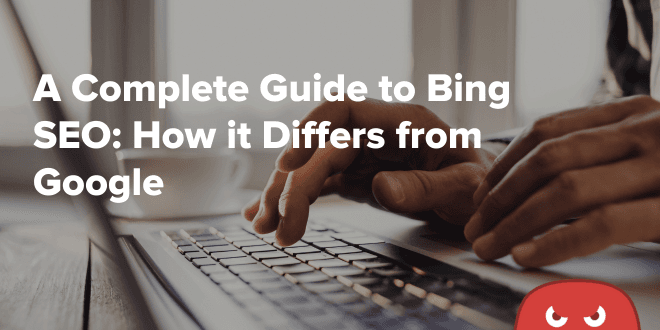
- There’s less competition on Bing, making it easier to rank higher for your money keywords
- While Google is the mogul of mobile search, Bing controls 10.5% of all desktop searches
- Console gamers prefer Microsoft Bing (it’s the official search engine on Xbox)
- Over 50% of Bing users are younger than 34
- Bing Chat, Microsoft’s AI chatbot, received higher performance scores than ChatGPT and Google Bard (according to Cornell University)
The Basics of Bing SEO
 First, you should know that if you optimize your website for Bing, you’re also optimizing it for:
First, you should know that if you optimize your website for Bing, you’re also optimizing it for:
Primary Differences from Google SEO
If you’re a level-100 Google SEO guru, you’ll run into some surprises if you try to migrate your tactics over to Bing. To ensure you don’t wind up in shock, here’s a look at the core differences between Bing and Google SEO:- Google places more emphasis on quality backlinks coming from relevant domains. Bing definitely values quality backlinks, too, but there’s more of an emphasis on domain age.
- Bing takes a precise, straightforward approach to keywords. Google takes a semantic approach that considers the ‘intent’ behind keywords.
- Social media is a crucial ranking factor on Bing, while it’s only slightly important on Google.
- On Google, meta descriptions are strictly for the user and have no impact on your rankings. On Bing, meta descriptions are a direct ranking factor, so they need to contain your target keyword.
- Including keywords in your URLs matters more on Bing than it does on Google.
- Bing has the capability to crawl and understand various types of multimedia, such as images and videos. Google’s bots lack computer vision.
- Google crawls and indexes the web far more often than Bing does.
What are the Top Ranking Factors on Bing?
Bing’s algorithm uses a similar yet different set of ranking factors than Google’s. Here’s a look at the top 5.- Relevance. Bing will examine how closely your web page matches the user query, so ensure you produce relevant content.
- Quality/Credibility. Just like Google, Bing wants to ensure that your content is high-quality and trustworthy. It does this through backlinks, social media signals, and author reputation. This means it’s imperative to provide author bios in your content optimized for Bing.
- Freshness. Bing favors content that’s fresh for its search results. Ensure that your content is factually accurate and up-to-date.
- User Experience. Bing’s algorithm looks at crucial user experience and engagement metrics when determining its search rankings. It analyzes things like dwell times, click-through rates, and social media signals.
- Page Load Time. Also, like Google, Bing only wants to rank websites that feature fast loading times. If you want to rank #1 on Bing, you need a website with fast speeds for loading, responsiveness, and interactivity.
Top Bing SEO Tips
Now that you know how Bing’s search algorithm ticks, let’s look at some best practices for Bing SEO campaigns.Creating content
Content creation is a staple of any SEO strategy, regardless of the search engine you’re targeting. Bing is no different, so you’ll need to create plenty of rich content to draw in audiences. Remember to include:- The author’s name, social links, and a short biography
- Up-to-date information (update your articles frequently)
- Keywords in your meta description
- Sources for every claim
Keyword research
Something to bear in mind when researching keywords is that most tools are configured for Google only. This means the data you receive won’t pertain to Bing, so you’ll need to use tools that include its search data. The best way is to use Bing’s very own Keyword Research Tool, which is included in its Webmaster Tools. It contains data straight from the horse’s mouth, and it’s intuitive and easy to use. Simply type in some head keywords for your industry, and the tool will work its magic.
It contains data straight from the horse’s mouth, and it’s intuitive and easy to use. Simply type in some head keywords for your industry, and the tool will work its magic.
Backlinks
Bing values quality backlinks over large quantities. Therefore, you won’t have to worry too much about closing significant backlink gaps like you do on Google. As such, your link-building strategy should focus entirely on going for the ‘big dogs,’ so to speak. Try to build links from reputable news outlets, relevant blogs, and websites with high domain authority scores. Also, look for established domains that have been around for a while since Bing places a lot of emphasis on domain age for backlinks. You can read more about specific link-building tactics here (the techniques work on both Google and Bing).Diversifying Your SEO with Bing
That’s how Bing works in a nutshell, and expanding your SEO to include it can do great things for your website. Whether you want to escape from Google’s fierce competition or appeal to new audiences, Bing SEO can be a great investment. Do you need help putting together a winning SEO strategy for your business? We’d love to help with our managed SEO service, HOTH X. We’ll take the entire process off your hands to simplify your SEO success, so don’t wait to try it out!The author
null null
description
Previous
The Ins and Outs of E-Commerce Technical SEO
Next
Crawlability: What It Is and Why it Matters for SEO
Discussion
Comments
OPTIMIND - TINA
November 23rd, 2025
There’s so much to take away from this—thank you for breaking it down so well. I’ll definitely be applying this in my own journey.
Akshay
September 4th, 2024
really good
digital marketer
September 2nd, 2024
really good
